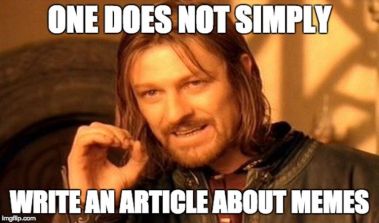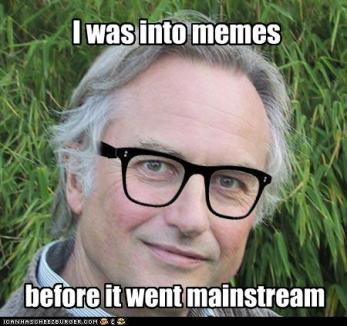
Lazily scrolling through the discover section of Instagram, a ritual regularly undertaken before my nine whole hours of sleep, I came across a video of an assemblage of teenagers attending a house-party dressed as stars of well-known Vine videos. The clip, which is roughly a minute long, showcased these teens re-enacting the vines of which they are dressed for. The collection of re-enactments included vines such as ‘Why you always lying’, ‘Road work ahead’ and ‘I could’ve dropped my croissant’. Vines are a subset of the ever-growing culture of internet memes.
The Oxford dictionary describes memes using two different definitions. The first illustrates meme in the broader sense of behaviours and artefacts which construct culture. The second description is one which most people may be more familiar with. This states that a meme is “an image, video, piece of text, etc., typically humorous in nature, that is copied and spread rapidly by Internet users, often with slight variations.”
In 1976, Richard Dawkins introduced the term meme to the world through his book ‘The Selfish Gene’. Dawkins used the word meme to explain the imitation of behaviours among humans to integrate into their own cultural society. Meme was inspired by the Theory of Natural Selection by Charles Darwin. While memes are not genetic, the concept of natural selection has been applied to explain the survival of certain cultural traditions and artifacts. The greater and wider an idea or concept spreads, the more likely it is to survive.

Since the growth of the internet, users have ‘hijacked’ the term meme to describe shared content which acts as one of many symbols of online culture. The heart of the original concept remains the same, but as meme has been popularized online, perhaps it is easy to forget that the term can still applied outside of the internet. Research by Carlos Mauricio and Castaño Díaz (2013), purporting to define the term ‘internet meme’, concludes that while Dawkins’ concept of meme is commonly used, it lacks to characterize the evolution of the term within the digitized era.
During an interview with Wired.co.uk Dawkins commented on the expansion of the meaning of meme by stating “the meaning is not that far away from the original. It’s anything that goes viral.”
Susan Blackmore, lecturer and author of ‘The Meme Machine’, mentions in a Ted Talk that the meaning of memes has evolved due to technology. She suggests that we give technological memes a different title such as ‘Temes’. I doubt that this suggested term will be quick to catch on, or even catch on at all. Meme is too established online for it to be changed.
Video source: TED.com
The term ‘meme’ is a meme in itself. While the meaning has been slightly altered to adapt to online usage, the name and concept has been replicated to suit users of a new digital era.
